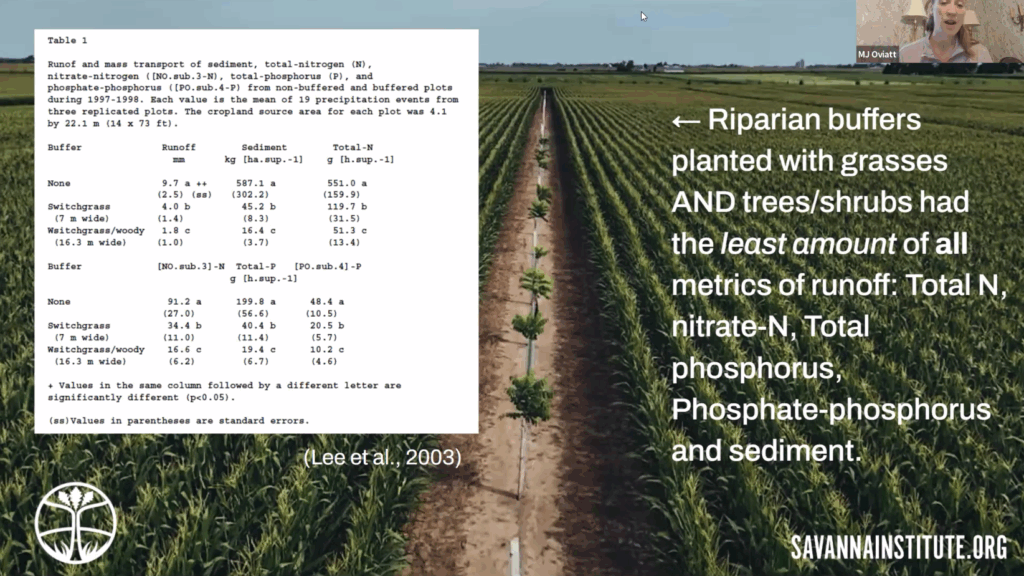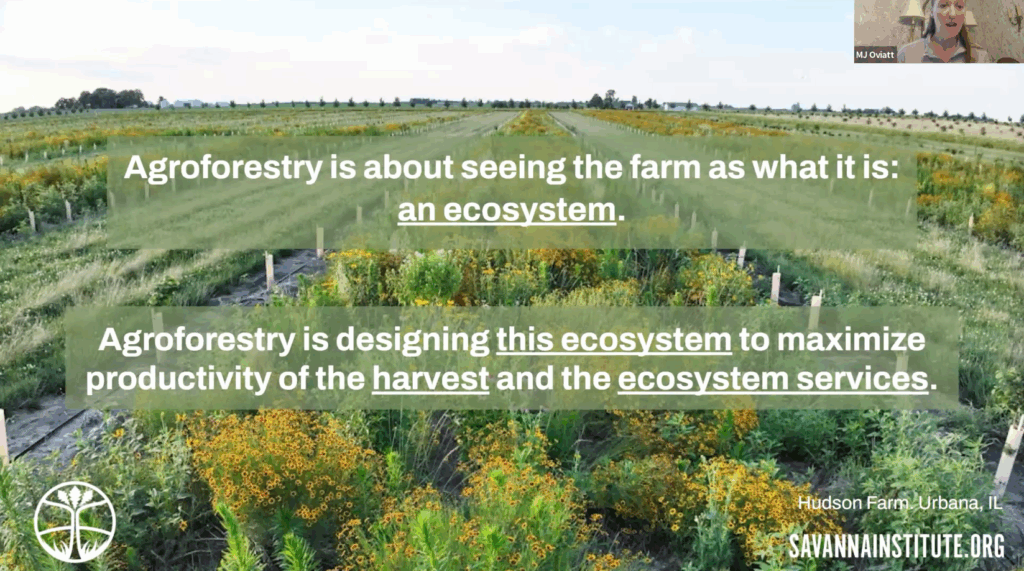On September 10th, our new and improved Illinois Conservation On-Farm Network (ICON) hosted MJ Oviatt and Kaitie Adams from the Savanna Institute. Oviatt is the organization’s Illinois Forestry Educator and Adams is the Demonstration Farms Director. The pair joined us to discuss the opportunities and benefits associated with incorporating agroforestry concepts and practices on traditional agricultural landscapes. Agroforestry can be defined as the intentional, intensive, and integrated incorporation of trees into traditional crop and/or livestock farming systems.
One of the most noteworthy benefits of agroforestry practices in row crops is their ability to aid in nutrient loss reduction. Perennial buffers that include grasses, shrubs, trees, etc. can help to reduce nutrient loss from the adjacent row crops by up to 90% based on information provided by Oviatt. To go along with nutrient loss reductions, she also reiterated that significant reductions in soil erosion can also be realized.

Riparian buffers planted with grasses AND trees/shrubs had the least amount of all metrics of runoff.
Farmers are increasingly becoming aware of the importance of good soil health management. Properly placed and well managed agroforestry practices can help in this area as well. Oviatt provided data showing that soil organic carbon and microbial respiration increased over time as planted chestnut trees aged from 0-20 years. As good soil health practitioners will tell you, these improvements lead to better crop performance and better function of the soil – ultimately leading to improved farm profitability.
One item that was especially interesting from this discussion was the emphasis and importance of practice integration with existing practices rather than “set aside” or separate areas for agroforestry. Savanna Institute emphasizes having good relationships with landowners, farmers, and neighbors to build successful and workable systems that view agricultural production as a whole ecosystem. It is worth noting that good blending of agroforestry and conventional grain production needs to be done in a manner that fits the ecosystem rather than trying to change the ecosystem.

As MJ mentioned in the webinar, although trees are another layer of complexity on the farm, it’s important to see the farm as an entire ecosystem. This can maximize ecosystem services and profitability on the farm long-term.
Savanna Institute has a footprint across Illinois, Indiana, Ohio, Iowa, Wisconsin and Minnesota. They have a network of offices, demonstration farms and partner farms that they utilize for education events and agroforestry trials and research. Illinois farmers and landowners may be most interested in the newest and largest demonstration farm located near Urbana, IL. The location boasts 70 acres of timber plus conventional row crop alley cropping, 20 acres of windbreak and 30 acres of Fruit/Nut plus habitat alley cropping.
Agroforestry may be a new or novel concept to some – especially those of us who are accustomed to the standard row crop environment. It’s worth investigating some of the possibilities and benefits of bring additional practices to the farm. As always – find what fits your system best. Thank you to MJ Oviatt and Kaitie Adams for joining us and sharing your work! To contact Savanna Institute with questions please feel free to contact MJ (mj@savannainstitute.org 608-448-6432 Ext. 225) or Kaitie (kaitie@savannainstitute.org 608-448-6432 Ext. 10).
Savanna Institute’s webinar can be viewed on ISAP’s YouTube channel. ICON will meet again on October 8, 2025. to talk “Cows, Conservation, and Commitment” with Lorilee Schultz, a dairy farmer in Orangeville, IL. Register today and join us! If you are interested in joining the Illinois Conservation On-Farm Network to learn about new research and hear from cover crop specialists across the Midwest, please join our google group by sending an email to hello@ilsustainableag.org.